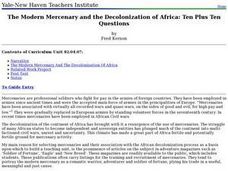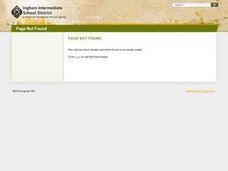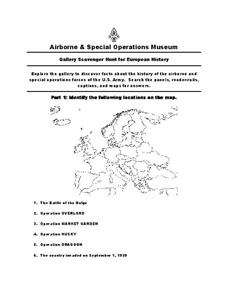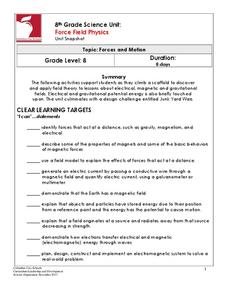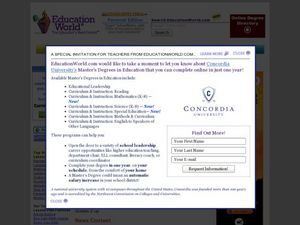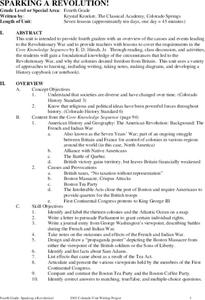Curated OER
Greek Geography
A riddle and a class lecture kick off this lesson on Greek Geography and city features. Learners use a worksheet to answer questions related to what they learned in lecture and complete a homework assignment. Note: This is a lesson...
Curated OER
The Modern Mercenary and the Decolonization of Africa: Ten Plus Ten Questions
Learners examine the role of the mercenary in the decolonization of Africa by answering the following questions: (1) Who and what is the modern mercenary; pro and con?, (2) What are some of the factors or elements which acclimatized the...
Curated OER
Portraits of History
Eighth graders research the Post-Revolution to Pre-Civil War era by investigating the life and contributions of a notable person. They create silhouettes which are framed with timeline. Also, they add the research information to the...
Curated OER
European History
For this world history worksheet , 5th graders look for information related to the history of Europe. They view the facts from a map and apply them to different activities.
Curated OER
Nationalism in North Africa and the Middle East
Africa and the Middle East are the focus of this Social Studies PowerPoint. After viewing many slides that are packed with historical facts, viewers answer questions such as, "How was the struggle for independence in Algeria different...
Columbus City Schools
Force Field Physics
Attracted class members to an activity-packed journey through the science behind the invisible forces at work all around us. From jump rope generators to junkyard wars, there's never a dull moment when eighth grade physics scholars...
Curated OER
The Great Depression: 1930s through WWII
Here is an oddly formated presentation that does have some great information and neat ideas. It includes images and text describing the causes and effects of the Great Depression, FDR, Herbert Hoover, and Eleanor Roosevelt. It also...
Curated OER
Analyzing Sources on Imperialism
Ninth graders explore the concept of imperialism. In this imperialism lesson, 9th graders analyze primary sources regarding British imperialism in Africa. Students analyze the sources for credibility as they gain an understanding of the...
Curated OER
Jamestown Celebrates 400th Anniversary
Students view a world map and identify the locations of England and Virginia and discuss what kinds of things they would take with them on this kind of trip. They read the words in the news box on the student page and fill in the blanks...
Curated OER
The Ethics of the Bomb: What Would You Do?
Learners research the use of the atomic bomb in WWII, analyze the human costs of dropping the bomb and identify the pros and cons. They develop a PowerPoint presentation on the effects of an atomic bomb dropped on their hometown.
Curated OER
Sparking a Revolution!
Students investigate the causes and events that lead to the US Revolutionary War. They use a number of study techniques in this unit to discuss why the colonies wanted freedom from Britain.
Curated OER
The Arms Race - From the Beginning to the End
Ninth graders focus on the political and technological developments of the Cold War. They, in groups, read and summarize the speech they are given. They should provide a short presentation based on their interpretation.
Smithsonian Institution
Cuban Missile Crisis
The United States—specifically John F. Kennedy—played a large role during the Cuban Missile Crisis. A history resource poses questions that encourage critical thinking as well as in-depth analysis of images from the time period.
Curated OER
An Effort to Ban Land Mines
Students campaign against land mines. In this WorldPeace lesson, students create educational posters about land mines. Students share their posters with their classmates.
Curated OER
WWII and the Atomic Bomb
Students explore three decisions about the atomic bomb faced by the U.S. during WWII, take a position on each of the decisions, and defend their position. Should a bomb have been built, dropped, and was the right decision made?
Curated OER
The Civil War
Eleventh graders study selected prints and/or photos and consider how Americans of the 19th century chose to present themselves to other Americans and the world by means of visual images. They share their observations and opinions.
Curated OER
City Bound
Fifth graders identify the reasons for people migrating to cities after the Civil War. Using population data, they discover why populations in cities rose while rural populations fell during 1860 to 1900. They discuss the impact a...
Curated OER
The Great Depression
Students analyze the causes of the Great Depression. In this Great Depression lesson, students listen to their instructor present lectures regarding the Dust Bowl, stock market crash, and Smoot-Hawley Tariff Act. Students conduct further...
Curated OER
Saudi Arabia
Students view a video clip about bombings in Saudi Arabia. They discuss the causes and implications of other recent terrorist attacks. They examine the United States - Saudi Arabia relationship as well.
Curated OER
The Good Earth - Essay Questions
In this literature worksheet, students respond to 6 short answer and essay questions about Buck's The Good Earth. Students may also link to an online interactive quiz on the novel at the bottom of the page.
Curated OER
Checks and Balances: Japanese-American Incarceration
Middle schoolers examine the three branches of the Federal Government and their decision to place Japanese-Americans in camps during World War II. They analyze debates made by leaders during this time period.
Curated OER
President John Kennedy
For this President John Kennedy worksheet, learners read a 2 page article and then circle 8 multiple choice answers to 8 questions or facts referring back to the article on President John Kennedy.
Curated OER
Follow Your Dreams: Career Goals
It is so important for impending high school graduates to start thinking about their potential careers. Here, they discuss the persistence of Blondie Hasler and his impressive transatlantic trip. They follow various routes on a map and...
Curated OER
Music, Culture and War
Students see that music serves as a major conduit for the transport of knowledge. As they watch video, students tabulate the variety of music artists listed by different soldiers.



